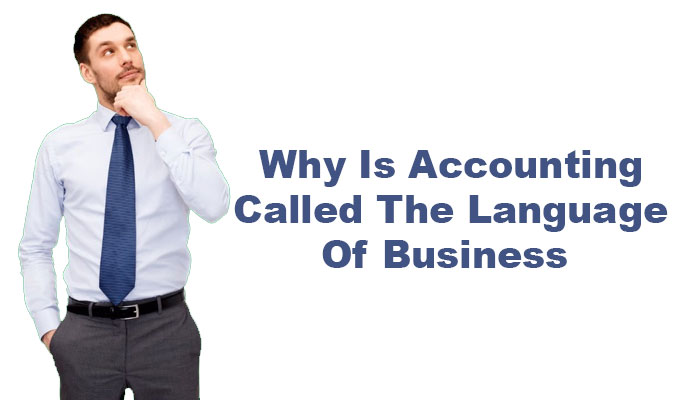Can two companies have the same name in different countries?
- By Infoik
- 08 Dec, 2021
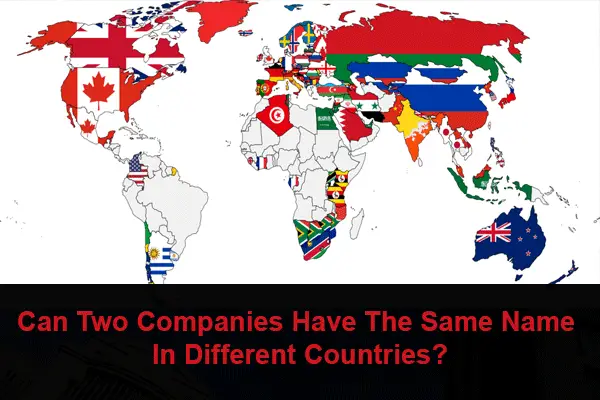
Can Two Companies have The Same Name in Different Countries?

A trademark has a territorial aspect; it functions only within the country or state where it has been registered. Therefore, to avoid problems in the future, you should register your company’s name with all relevant authorities before making any changes to current business operations, which could confuse customers and investors alike when they try to look up information about their products/services on Google Search.
Names are important, and it’s good to know the legalities behind them. You can register your business name with any state or country you want as long there is no conflict between those names- but just in case! There could be trademark issues if two companies have the same one, too.
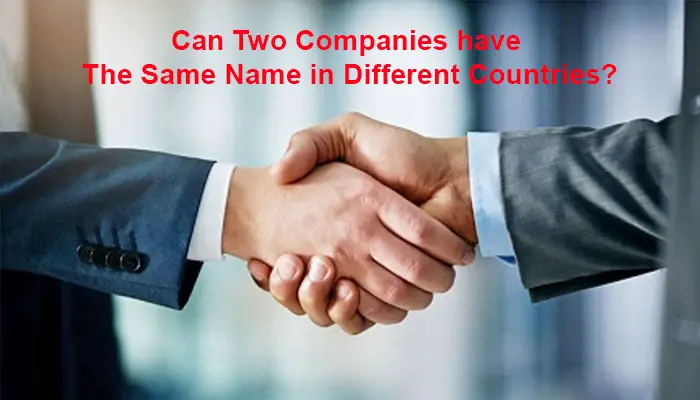
The most pressing issue you need to address if your business has the potential for global success is ensuring that another company is not already infringing upon it.
This can be an especially tricky matter when another business operates under a similar or identical name. Still, trademark rights depend on how they’ve proceeded legally regarding protecting their mark.
How Trademarks Prevent Duplicate Names in Different States or Countries?
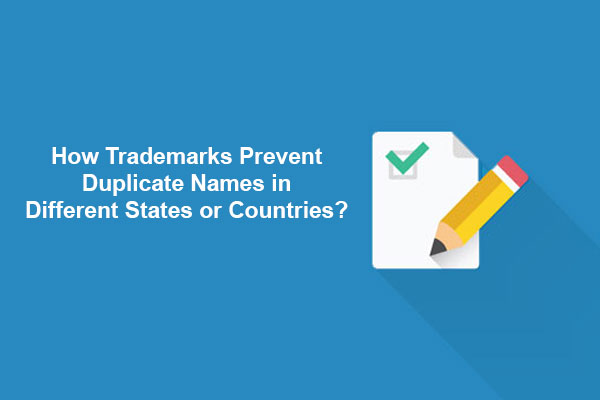
Trademark laws are a way for businesses to protect themselves from unfair competition. Companies may want the protection of trademarks because they can be an easy identifier, but consumers also benefit by differentiating between brands and companies on sight. For example, if there were two competing restaurants with similar logos or names, customers would have difficulty telling which one was legitimate as both might seem just as good!
The beauty of the trademark system is that it’s unique. If you use another business’ name, they can demand fair compensation for their loss in revenue; which could mean dollars out of your pocket! Protect yourself by checking with current clients or other companies who might be interested before applying anywhere else, make sure not to confuse them if there are any chances at all.
Many complexities arise in the world of business, and trademark law is no exception. For example, there may be scenarios where you’re first to use your company name. Still, another entity already has an official registration for it with state or federal governments before you do so – which means they get priority over yours!
In most cases, courts will allow you to use a trademark in your market but limit the business activities. The only exception is if it can be proven that another company knew your enterprise before registering its mark. In the United States, this would mean an infringing party may face legal action and either civil or criminal penalties for “willful infringement.”
In some cases, businesses with the same or similar names operating in overlapping markets and locations can end up going to court. Settling these matters out of court is preferable because it’s often less expensive for both parties involved than litigating their case before a judge or jury at trial.
4 Steps to Take When Your Chosen Business Name That Already Exists in Another State or Country
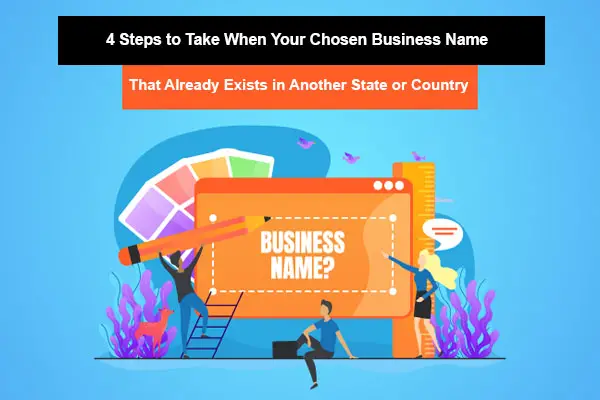
If you want to start a business, your company’s name must match what customers will expect from it. But how can this be if someone else already owns or registered their domain name? For people not to get confused about who is running an establishment under those terms, there are steps each state has in place when applying and some other factors that could lead to being denied by determining whether another person might have filed earlier than yours.
1. First Check State Records
Naming your business is not an easy task. You need to be mindful about which state has rights for each type of company to ensure that you are legally protected and find the right name before getting too serious with this process! Luckily there are databases available online where you can search and verify if any businesses have taken on similar names as what yours might become or already exist using just a few clicks; saving time overall for both yourself and potential clients who may want more information from their prospective vendor/suppliers’ products prior starting negotiations.
2. Expand Your Research
After checking to see if your prospective business name is available in the state where you live, it’s time for another step. Sometimes people plan on taking their company nationwide eventually (or at least nearby states). The first thing that should happen after Googleing “my new business name” is looking up any prominent businesses with similar names so they can find whether there are any trademarks or lawsuits against them already using this moniker.
You might find that some of the companies with your business name are no longer in operation. If this is the case, it could be an opportunity for you!
The following search will track down contact information from any businesses which bear a similar moniker to yours – use them as leverage when investigating whether these firms are still active or not by looking at their past performance stats before making decisions accordingly.
3. Consider Your Next Line of Action
If you find that a reputable company is using the name of your dream business but is not located in their state or country, here’s how to proceed. You will have two options: keep doing what you’re already doing and take it national someday down the road if possible; also, consider registering another location for them since most states allow businesses with different addresses under one roof as long as they follow all local regulations governing ownership transfers between entities within same borders.
You’ve been brainstorming a billion business ideas and have finally settled on one. It’s so close to what your favorite company in the world does; you can’t help but think they’ll love it too! But wait… registering this new name as an LLC or even using their registered trademark constitutes copyright infringement against federal law. For example-so be sure not to do anything illegal when pursuing any potential typosquatting schemes.
The moral of our story? “Don’t register anything that matches another companies’ currently held registration.”
4. Explore a Name Transfer
It’s time to put that contact information you acquired earlier to good use. Since the other business presently holds the trademark for that name in their state, it is essential to reach out and ask if they are willing to transfer ownership over themselves – but this doesn’t necessarily mean free of charge or without conditions; sometimes, deals like these come down between two parties who want what’s best for each company.
You can consider getting complete control of an existing registered domain as an investment into your company!
FAQ:
Can someone use my registered business name?
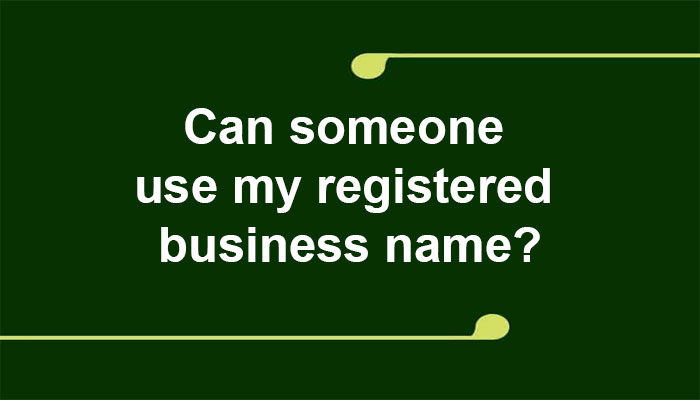
Anyone can snag a business name and use it for their own company. But, unfortunately, no one agency or database ensures only one person has claimed ownership of the trademarked phrase, “Amazon,” in this case.
What happens if someone has your business name?
You can start a business in your hometown by registering the appropriate name with local authorities. This prevents others from using that specific brand and alerts you if someone else starts doing so without permission from any other company’s trademarks or intellectual property rights.
How do I keep someone from using my business name?
It’s essential to protect your business from competitors who may try and take advantage of you by using the name or branding without permission. The best way is through trademarks, which help consumers identify what they’re buying from a specific source, so there is no confusion about where it came from. For them to get approved, though-the law requires filling out an application with USPTO (the United States Patent And Trademark Office). Unfortunately, the filing doesn’t automatically mean approval at this point because not everyone gets their trademark immediately after filing!
How do I know if my business name is already taken?
Are you worried that someone else might be using your business name? The best way to find out if it is taken, besides doing an entity search within your state and checking federal trademark records (which only covers the US), would also include searching on Google for businesses with similar names.
Should my LLC be my business name?
To limit the liability of owners in an LLC, each state requires a designation to be included. The appointments vary from state to state but generally include phrases such as “Limited Liability Company” or “LLC.
Final Words
Naming your business is an essential first step in establishing the foundation for success. While it won’t always be easy, you will feel satisfied knowing that these challenges are necessary to build toward more incredible things! Consult with a trademark attorney if there’s any uncertainty or confusion regarding what name would suit both this moment and future endeavors; they can research on behalf of us taxpayers who don’t know how to register our trademarks.





